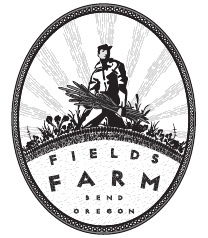Yes we have a bounty of colorful lettuce and yummy eggs. The frig will be well stocked all weekend.
A bounty of lovely lettuce and eggs
post by: Debbie Fields June 18, 2010
Kohlrabi Pizza?
post by: Debbie Fields June 11, 2010

fresh from the ovenNot only is Kohlrabi alien in appearance but it is alien to just about all of our food histories–We have no reference of what to do with it and its not something that fits into a category so we can just plug it in, in place of other foods. It is unique, yet paradoxically a very versatile ingredient.Fields Farm has got them and I bagged a couple at the Farmer’s Market. When I got home I had some Pizza dough that had risen. Pizza could very well be the most popular food ever invented. A few years ago I mastered the art of making my own Pizza –its not that difficult– I then asked myself what had I been doing with my life up until that point.Pizza dough is simply 3 cups of flour, a teaspoon of yeast, a tablespoon of salt and a cup of warm water. This will make 2, 10-12 inchers. Knead it well to break down the gluten. Let it rise at least a hour and a half and stretch it out onto a cornmeal covered peel. You will also need to get a Pizza stone to cook it on. Stretching it out does not take too much practice, you do not need to be one of those showman Pizza tossers, you can just stretch it over a large bowl. You cook it at your ovens highest temperature and it takes only 6 to 8 minutes.
A couple slices with some of the
greens and a hearty redAfter the layers of tomato sauce and Mozzarella Cheese, I grated a medium small Kohlrabi and added to it 1/3 of a chopped onion, a couple of cloves of garlic, 2 good tbls. of olive oil and some fresh thyme. I spread this over the pizza.The Kohlrabi added a subtle, slightly spicy, vegetative crunch that balanced well with the crust, sauce and cheese. I used 2/3 whole wheat flour for the crust and this complemented it well too. Though this was the first time ever on Earth that a Pizza like this was made, it seemed like a normal, natural Pizza. It wasn’t as dramatic as say a Jalapeno, anchovy and pineapple Pizza, but it was wholesome and satisfying. This was an experiment that worked and I will do it again. If any Pizza place puts this on their menu, they must name it after me!
sliced
What’s on
post by: Debbie Fields June 7, 2010
A few warm days and rain make for very happy plants. This week we will have:
Lettuce Mix – $4.50/bag
Greens Mix – $4.00/bag
Broccoli Rhab – $4.00/bag
Kohlrabi – $2.00 or 2 for $3.00 depending on size (very tender and sweet)
Morel Mushrooms(wild crafted) – $5.00/ quarter pound bag
Eggs – $4.00
Our squash planting, all out tomatoes and cucumbers made it through some very
chilly nights for which we are very thankful.
Fieldtrips Slideshow
post by: Debbie Fields May 21, 2010
A slideshow of fieldtrip photos is now up on the Fields Farm website at:
http://www.fieldsfarm.org/fieldtrip
Parents, teachers, volunteers and whoever took photos–there were many of you–are encouraged to add their photos to the flickr Fields Farm fieldtrip group at:
http://www.flickr.com/groups/1459758@N22/
Your photos will then show up in the slideshow. Details on how to add your photos are at the first link above.
Shed Construction
post by: Debbie Fields May 19, 2010
Please excuse our construction mess. On Monday we took down the old harvest shed and now there is an open space. Tomorrow we start the framing of a new walk in harvest shed which will offer more protection for the produce and a more comfortable pick up space. However for the next few weeks the eggs and veggies will continue to be in the grey refrigerator which is perched on a pallet. The information board and green box are under the white canopy over to the left of the old shed. If the winds are howling we have to take the canopy down. The large white coolers under the canopy are for CSA members only. There is an ample supply of eggs, lettuce mix, mizuna, arugula and spinach. If you can’t find what you need, give a honk and someone will come help you.
Listen to Fields Farm’s Jeremy from a KPOV interview
post by: Debbie Fields May 16, 2010
As last years intern at Fields Farm, you may know Jeremy from the farm or Farmer’s Market. This year he is staying involved with Fields Farm by putting together the educational program that is bringing hundreds of school children to Fields Farm for fieldtrips.He was interviewed recently on the KPOV show Radio Airstream about the program and about his experience working at Fields Farm. KPOV graciously provided us with a copy for your listening convenience. JeremyFox.kpov.interview.mp3
Support KPOV!
Hundreds of Schoolchildren visit Fields Farm
post by: Debbie Fields May 12, 2010

Jeremy introduces the kids to a real farmer-JimIn a program created and run by last years Field’s Farm intern Jeremy Fox, hundreds of Central Oregon kindergarten through 6th graders are visiting Fields Farm on educational field trips. The visits started Monday and will continue through the next 3 weeks. 
Feeding the goatsVolunteers are guiding the kids to various areas of the farm where they learn about field plantings, greenhouses, irrigation, livestock at the farm (goats and chickens), bees and compost. They also get their hands on some farm tools and get to plant some seeds, which they get to take back to school and watch grow. How the natural ecosystem interacts with the farm is also pointed out. So far the kids are having a great time, while they learn something too.If visiting the farm over the over this time period, before 1 pm, you can expect children running around, school buses and other traffic, so please be cautious.
Spring Greens!
post by: Debbie Fields May 5, 2010
Spring Greens! The wonderful thing about spring greens is even though it is snowing they still grow. We are harvesting a multi-colored lettuce mix, a mild asian greens mix( good both fresh and steamed) and spinach. Bags of these green are available in the grey refrigerator with the eggs for $4.50/bag. Remember to bring correct change as there is usually no more than $1 of change available in the box. Please write down what you are buying in the small spiral notebook in the green box. Enjoy some of the most tender greens of the season.
Fields Farm Update
post by: Debbie Fields April 9, 2010
Hi Folks,
As usual we are having typical challenging spring weather here in Central Oregon. However we have two field tunnels filled with starts of lovely spring greens. The first plantings of carrot and peas are also in the ground waiting for a bit of warm weather to pop their heads up. The irrigation water should start flowing this evening. The honeyberry bushes bloomed in the midst of this cold snap so we probably won’t be seeing any berries from them this year. All the other fruits have held off blooming. The garlic is a good 8 inches tall and the rhubarb is up and growing. We continue to have plenty of eggs and Wild Rice.
Good food is coming soon!
Local Schools Scheduled to Visit the Farm!
post by: Debbie Fields March 28, 2010
Nothing like a nice spring week to get us thinking about gardening and the outdoors…only to be slapped with more snow and cold weather to remind us that winter is still here. I hope everyone’s winter was restful, and in case you don’t remember me, it’s Jeremy from the Intern’s Insight blogs of last summer. While I won’t be working at Fields Farm full time this year, I am staying involved, and this blog is to inform you about this spring’s Fields Farm school field trip season. Ten area schools have signed up to come out to the farm in May and early June for a half day of touring the farm, meeting the farmers, and learning about where food comes from. The available trip times filled up fast, and I think it is a testament to how much our teachers want to teach their students about food…thanks teachers! Now, you might be wondering why I’m posting this blog on the website, and there are a few reasons: 1. If you come out to buy produce or eggs at the farm you may be there the same time as a field trip, so please drive slow and watch for kids, 2. Maybe you are interested in being involved with the field trips as a volunteer guide or by donating some materials! As I began recruiting volunteers I thought, “what better group of people than those already on Fields Farm email list…they are probably passionate about educating others about food!” The volunteer guide will be leading a small group of students to different stations around the farm, and leading a hands-on activity at each station. If the thought of this is appealing to you, please read on! If the thought of this scares you, don’t worry and please read on! I am working hard to create a binder with enough information on agriculture, the farm, and how to teach the activities to make YOU an expert for the day. The field trips are during ten days in May and one in early June, and are morning trips that last until noon. This will be a wonderful chance for you to pass on your interest in food and agriculture to the next generation, so please consider taking a morning to be a volunteer guide for one of the field trips. No teaching experience is necessary as there will be a volunteer guide training on a Saturday before the field trips begin. And if you would like to support the field trips by material or financial donation, your support is greatly appreciated…the schools are nearly budget-less and yet these teachers are pulling together enough resources to get a bus for the day and come out to the farm! Please contact me with any questions, and to sign up or donate…zorndylan@hotmail.com or 541-390-1558. Looking forward to spring and seeing you out at Fields Farm!
Jeremy






